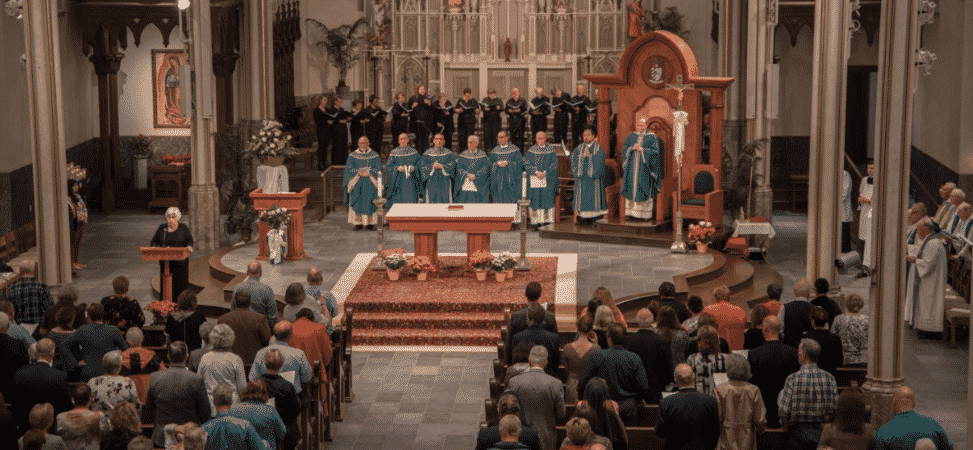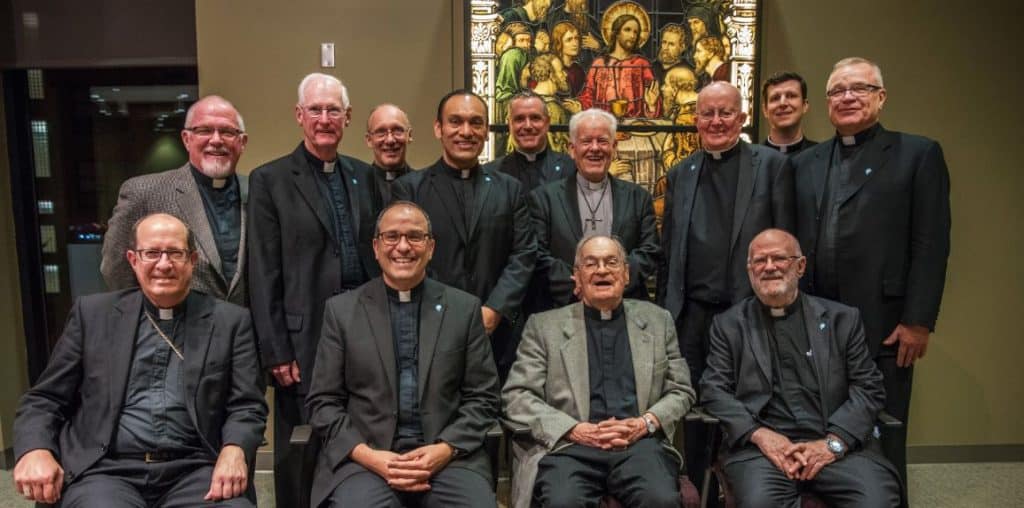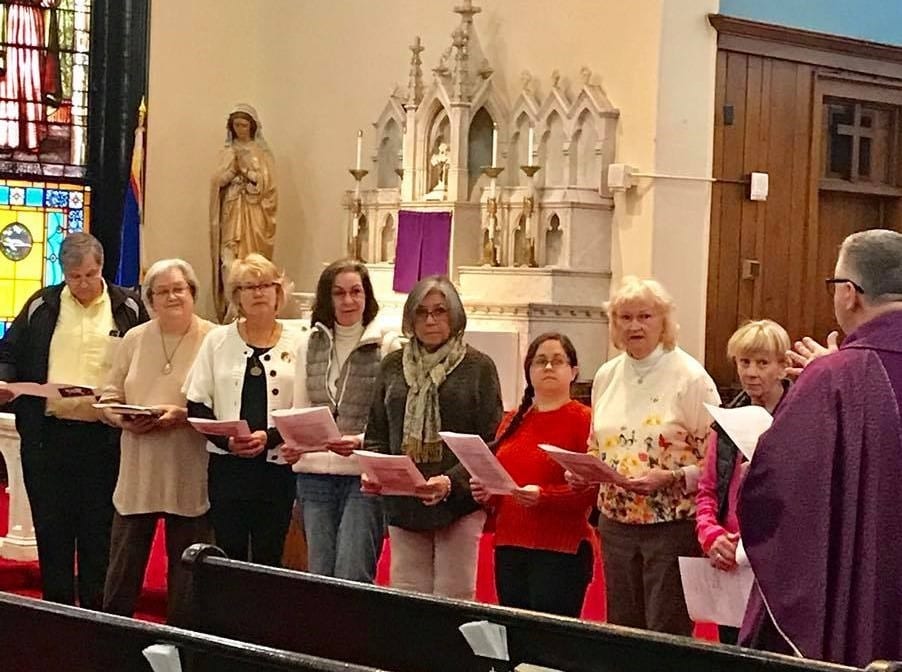April 2, 2018
A Monthly Newsletter for Paulist Associates
The Associates World is the newsletter of the Paulist Associates. You can download a copy of this newsletter in PDF format (excellent for printing), or scroll down to read it in your Web browser.
- Applying CST Principles to Promote Constructive Dialogue
- Celebrating 70 Years in Grand Rapids
- Remembrances of Fr. Frank Stone, Paulist Father
- Proposed Program for May
- 2018 Annual Retreat for Paulist Associates in Knoxville
- Upcoming Election of Board Members
- Prayer for the Intercession of Father Isaac T. Hecker
- Contacts
- Promise
by Leroy Husak — Paulist Associate in Columbus, Ohio
The angry divisiveness that has sorted Americans into opposing “tribes” is replicated within the Catholic community. Conservative and progressive Catholics appear incapable of hearing and understanding one another on a wide range of issues crucial to the well-being of our most vulnerable brothers and sisters in the U.S. and around the world.
Recently, a member of the Ohio State Newman Center action and contemplation group suggested we apply the principles of Catholic Social Teaching (CST) to evaluate crucial legislation and policies of our times. The principles of CST are rooted the Gospels. There are seven principles:
- Life and Dignity of the Human Person
- Call to Family, Community Participation
- Rights and Responsibilities (human dignity depends on human rights)
- Option for the Poor and Vulnerable
- The Dignity of Work and the Rights of Workers
- Solidarity (we are one human family)
- Care for God’s Creation
These principles are embraced by the Catholic Church and by all major faith communities, both Christian and non-Christian, and by many with no religious affiliation.
Health care, immigration, tax policy, and other essential issues are distorted by a blizzard of false and misleading claims designed to target people’s greatest fears and disparage the motives of the “other side.” If the integrity of the rival “tribe” is discredited, their policies can be automatically rejected without an honest examination of their possible merits. CST principles provide common frameworks for assessing, discussing, and debating the issues that have a profound effect on millions of American lives and the lives of all affected by American policies. For example,
- Can we have a just society when many of our citizens do not have affordable, quality health care coverage?
- Does proposed health care legislation expand affordable, quality coverage, especially to the most vulnerable?
- Does Congress’ failure to fund the Child Health Care (CHIP) program for low-income children, violate basic standards of justice and fairness that bind us as a community?
- Is tax reform legislation that cuts taxes for the wealthy at the expense of the working poor and middle class consistent with our commitments to individual dignity and family solidarity?
- Does the House budget resolution slash social programs for the “least” among us?
- What does fate of adolescents and young adults of Deferred Action for Childhood Arrivals (DACA) tell us about our commitment to human dignity?
- How does threatening the nuclear agreement with Iran and engaging in nuclear brinkmanship with North Korea and Iran square with our responsibilities as peacemakers and in caring for God’s creation?
Using CST principles as tools when considering policies and legislation can promote constructive dialogue by appealing to our most cherished values.
by Cathy Hoekstra — Paulist Associate in Grand Rapids
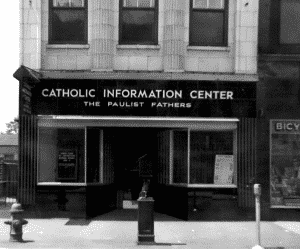
To form a community and raise support, the first two Paulists conducted pulpit dialogues at St. Stephen’s Church and St. Andrew’s Cathedral. They also gave radio talks and retreats.
In late 1947, with the support of a growing community and the diocese, a building known as Jack’s Cut Rate Clothing store on Monroe Avenue was purchased. Renovation of this building, converting it into a small chapel, classrooms, and offices were completed. The Catholic Information Center and the Chapel of Christ the King were dedicated and blessed by Bishop Haas on June 3, 1948.
The Paulist Fathers provided opportunity for people to attend a Catholic faith inquiry class or talk with one of the Paulists about their questions, doubts, and faith. The Chapel of Christ the King provided an ideal place for Catholics working downtown to go for a few moments of quiet reflection or attend daily Mass.
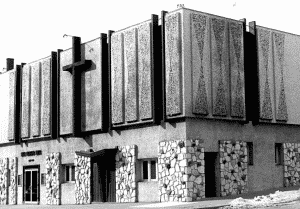
In 1977, a new brick facade was added to replace the badly deteriorating exterior stone and stucco. Renovations to the chapel interior were made in 1984 to provide added seating to accommodate the large number of people gathering for worship and barrier free access for handicapped members of the community. The chapel was renamed the Chapel of St. Paul.
For many, the intimacy of the liturgies at the Center has been a great assist to their faith life. Creative use of media and advertising were used to bring the message of faith to those outside a religious tradition. Outreach to separated and divorced Catholics and others on the margins of the Church became another ministry of the Center. Book and film discussions and speakers on issues of faith and culture were offered.
After Vatican II, the Paulists and the Center members participated in ecumenical dialogue and started the Advent and Lenten reflection booklets that we still have today. The Landings program at the Center welcomed back those Catholics who had left the Church for one reason or another. A peace and justice committee encouraged participation in the efforts for peace in the 1960’s and 70’s, participation in Habitat for Humanity, ministry in the Heartside neighborhood, the annual hunger walk, and refugee resettlement.
In 2007, the Paulist Fathers were asked to establish St. Luke University Parish and campus ministry at Grand Valley State University. This same year the Paulist Associates of Grand Rapids made their promises for the first time and committed to supporting the Paulist Fathers and living out their charisms and the vision of their founder Servant of God Isaac Thomas Hecker.
From 1947 to the 1980’s, the Catholic Information Center prepared and received more than 8000 people into the Catholic Church through their “Catholic Inquiry” series.
In 2008, the Paulists were asked to take on the challenge of leading the diocese in evangelizing new members, to focus more on adult formation, and to relocate their priests and worship communities to the Cathedral of St. Andrew.
The CIC moved to the 2nd floor of the Cathedral Square Building. It is equipped with the technology and space requirements to continue the Paulist mission of evangelization, reconciliation, and ecumenism. The CIC is an access point for people interested in the Catholic faith, continues to build bridges with those who feel disenfranchised, and with other Christian denominations and with members of other world religions.
Looking to the future, the CIC will begin three new initiatives this coming year, Young Adult Leadership, Hispanic Lay Leadership, and more in-depth scripture training for parish professionals.
Four major events were planned to celebrate the 70th Anniversary.
1. On July 15, 2017, a pilgrimage to all four sites where the Paulists had ministered was held. At each site a short history and Gospel passage were read, and a litany of thanksgiving for the blessings of each site was offered. The pilgrimage was ended with a Mass of Thanksgiving at the Cathedral of St. Andrew.
2. On October 14, 2017, a Mass commemorating the 70th Anniversary, with Bishop David J. Walkowiak as celebrant was celebrated with many Paulists as concelebrants. The Mass was followed by a festive dinner at which eleven Paulist fathers were present, including local Paulists, previous directors of the CIC, and Paulist leadership.
3. A Mardi Gras party happened in February.
The closing event will be a Parish festival in June.
by Molly Sutkaitis — Paulist Associate from Toronto
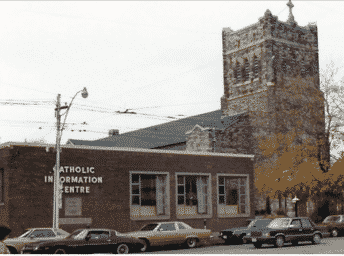
What my father read out to me was an article about Adult Education that took place at the Catholic Information Centre at 830 Bathurst Street, Toronto. My father insisted that I ought to check this place out when I arrived in Toronto.
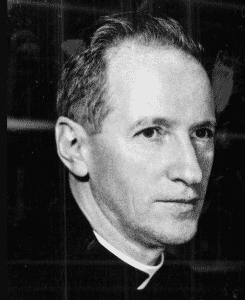
In 1946, Fr. Frank Stone started adult classes called “Understanding Catholicism.” This was a aimed primarily at people who were interested in knowing more about the Catholic faith, I.e. mainly people who were going into “mixed marriages,” so the non-Catholic partner would be able to understand more fully the way of life of their future partner. Soon other people who were interested in Catholicism made inquiries about the Catholic way of life and classes were set up: at first these were held in the basement of St. Peter’s Church. The classes became so popular that they were moved to 830 Bathurst Street.
I came to Toronto in August 1963. As I had listened to my father’s plea to find out more about the programme “Understanding Catholicism” I spoke with some of the Catholic teachers that I had met on board ship and a group of us went down to 830 Bathurst Street. I was spellbound by the positivity with which Frank Stone of the Paulist Community spoke of the power of the love of God. That first night I remember him talking about the uniqueness of each individual and how each individual who got on God Our Father’s wavelength, reflected God’s love. The next day at my religion lesson to my Grade Three children, I told them how they were all gifts of God Our Father’s love. I later learned that this fact caused lots of discussion around the dinner table!
Adult Education flourished at the Catholic Information Centre, it was also known when I attended “Understanding Catholicism” classes as The Communications Centre. These classes now take place in parishes when ‘mixed marriages” are celebrated. To my mind, Fr. Frank Stone was the most important bringer of Christ in my life. He taught me to see Christ in everybody. This was a wonderful gift that he imparted. May his communication skills continue to be spread by those who knew him.
May he rest in peace.
(This is a suggested format; each group may select another outline or topic.)

Opening Prayer: The Paulist Prayer Book, select the day on which you meet or you may select the Morning Prayer for Pentecost on page 336-338 or Evening Prayer for Pentecost on pages 339-346.
Reading (in advance of the meeting)
From “EPILOGUE TO THE ORIGINAL EDITION — ON THE MISSION OF NEW RELIGIOUS COMMUNITIES
(written in 1876); found in The Paulist Vocation
THE essential aim of Christianity is to communicate to the soul a higher, nobler, diviner life than that in which it is born, in order to establish God’s kingdom within itself and upon earth, and in this way prepare it for the blessed life after the present state of its existence. This communication is called “the new birth,” “regeneration,” etc.
The Christian Church dates her birth from the day of Pentecost, when she was endowed from on high with the never failing presence of the Holy Spirit who is her indwelling life and power.
Sanctity is the addition of the Divine Spirit to the soul in completion, by the aid of which the reign of God is realized. When so aided the soul is habitually actuated by the instinct of the Holy Spirit.
The Holy Spirit is essentially and always the same. But the manifestations of the Holy Spirit vary according to the characteristics and dispositions of His rational recipients.
Hence in the history of the Church there are various phases of her life, the characteristics of which are made up of the action of the Holy Spirit on the one hand, and the co-operation and different obstacles met with on the other hand, in the work of the regeneration and sanctification of the human race.
The truth of this is evident: How different in character are the Epistles of St. Peter from those of St. Paul; and these, again, from the Gospel of St. John. But each was equally an Apostle, and wrote by the inspiration of the same Holy Spirit.
Once more: The Greeks with their speculative and subtle intellect penetrated into the sublime mysteries and truths of Christianity and clothed them with proper expressions; the Latins with their practical genius for government and law developed the hierarchy and discipline of the Church. As, for instance, the definition of the central mystery of the Christian faith, that of the Most Holy Trinity, is due to the intellectual gifts of the former, and the declaration of Papal Infallibility as an article of Catholic faith, the central point of the ecclesiastical hierarchy and government, is the fruit of the practical genius of the latter, yet in both cases under the guidance of the Holy Spirit. The Latin-Celts with an imaginative and emotional nature have contributed to the development of her devotion and aesthetics.
The genius of races or individuals does not modify or add, but serves as an instrument to the development of Christianity. It is the Holy Spirit which finds in their varied capacities the proper appreciation of the revealed truth, and the aptitude of giving them their suitable expression. For the Creator of the human race and the Founder of the Church and the Author of revelation are One; and it is through the Church that God acts immediately or directly on men, and calls individuals and races to come upon the scene and take that part for which He destined them in the great drama of the world’s history.
Conversation Catalyst
- Holding diversity as a value requires us to acknowledge that differences between people are assets. How do we teach children and youth to respect different cultures while remaining proud of their own culture, traditions, and religion?
- What are some of the benefits of diversity for your local church community? Are there any challenges?
News/Announcements
Closing Prayer
For the Diversity of Races and Cultures
O God,
you created all people in your image.
We thank you for the astonishing variety of races and cultures in this world.
Enrich our lives by ever-widening circles of friendship,
and show us your presence in those who differ most from us,
until our knowledge of your love is made perfect in our love for all your children;
through your Son, Jesus Christ our Lord.
Amen.
– From the Lutheran Book of Worship: Minister’s Desk Edition
by Charles Jones — Paulist Associate from Knoxville
The Knoxville Associates from Saint John XXIII and Immaculate Conception gathered February 16th-17th for two days of prayer and retreat at Immaculate Conception Parish. On the first day, a Friday, Associates gathered for a Fish Fry and Lenten Stations of the Cross. On the second day, a Mass and annual renewal of promises; in addition, I was welcomed as the newest Paulist Associate when I took my promise for the first time. During the rest of the day, we participated in a spiritual retreat. Judy Cross, someone currently in the formation process, also joined us.
Present at the meeting were: (Pictured here L to R) Charles Jones, Rosilyn Flanagan, Jaci Fryxell, Jackie Owen, Sonia Allen, Kimberly Lynch, Peg Hart, Kathy Roberts, and Fr. Bob O’Donnell CSP.
Fr. Bob’s presentation was entitled “The Friends of Paul Speak.” He posed a question: “how did some of the New Testament personages experience Paul and what would be their story of the encounters with the Apostle?” Fr. Bob identified five significant associates of Paul — Ananias, Simon Peter, Barnabas, Lydia and the couple Priscilla and Aquilla — along with corresponding scriptural passages, reflecting on their encounters with Paul. Fr. Bob took on the role of each character in the first person, replete with their symbols (such as keys for Simon Peter and olive branch for Barnabas), describing their encounter and work with Paul. Experiencing each of these individuals provided the retreatants with a deeper experience not only of roles of these followers but also in shaping understanding of the Apostle Paul himself. We were drawn to the question: “examining how these five, impacted by St. Paul, lived their Christian lives and mission, what insights might we glean for our Catholic Christian calling?”
After lunch, we watched the documentary: Isaac Hecker and the Journey of Catholic America, written and produced by Reverend Tom Gibbons, CSP, followed by a discussion. The retreat closed with a Rosary. We enjoyed our time of prayer, learning, and fellowship.
by Paula Cuozzo — Paulist Associate from Boston

Early on, the Paulist Associates Board decided that two Paulist Associate members would serve until 2018 and the other two serve until 2020. We determined that this process will allow for continuity and provide opportunities for other talented individuals to serve. Hereafter, two Board members will step down and two more elected every two years.
After careful consideration, we agreed that Cathy Hoekstra of Grand Rapids and Katherine Murphy Mertzlufft of Columbus will continue serving for two more years, and Angie Barbieri of Toronto and I will rotate off the Board. Thus, all Paulist Associates will be asked to participate in an election of two new Board members.
As we did in 2015, this time each Paulist Associates group (including the Paulist Associates in Diaspora) can nominate one person for the ballot. (Each group is not required to determine a nominee If no one from that group wishes to volunteer.) Also, we want a broader representation, so Grand Rapids and Columbus will not put forth another person for consideration.
Each nominee will be asked to email a photo along with a one paragraph statement to Fr. Frank on why he/she wishes to serve on this Board. We will then disseminate this information to everyone, and Fr. Frank will forward the ballots to all Paulist Associates.
Being a member of this Board is a joy and hard work. I believe that we can accomplish so much because we hold a common faith and share in Hecker spirituality lived out in the Paulist mission and ministries. We are a collaborative body of Paulist Associates and Paulists striving to strengthen the bonds of mission between, foster better communication among, and offer prayers and support for all Paulist Associates and Paulists. We meet each month via a conference call as well as working on projects individually or in small sub-committees. We have tackled many small and large projects, including:
- creating and maintaining a database for the mailing address, phone numbers, and emails of all Paulist Associates (nearly 200!)
- revising the Paulist Associates Handbook
- updating the formation process for those considering becoming Paulist Associates (we are currently reviewing and making additional amendments to the resource and the process)
- providing more prayer opportunities through the regional and national retreats
- increasing our social media presence
- re-launching this monthly newsletter for the Paulist Associates (which many of the Paulists also read)
- helping to form a Diaspora group for Associates who no longer live near a local group
- cataloging, formatting, and distributing a collection of Hecker quotes
- distributing a variety of other resources
I am proud of the work that the Board has accomplished. And still, there is more to do as the Paulist Associates grow in number.
In addition, serving on this Board has also helped me to deepen my own spirituality as a Paulist Associate as well as giving me the opportunity to become friends with the other members of the Board.
I hope that your group will prayerfully discern and consider selecting a candidate who is willing to contribute not only to the life of the local Paulist Associates group but also to Associates around the world.mises as well as a list of those who have opted not to renewing promises to [email protected].
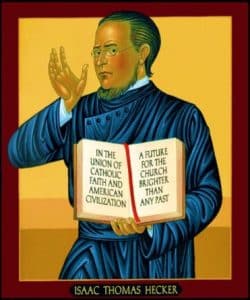
Look upon us this day, with compassion and hope. Hear our prayer. We ask that through the intercession of Father Hecker your servant, you might grant us (state the request).
We ask this in the name of Jesus Christ, Your Son, Our Lord, who lives and reigns with You and the Holy Spirit. One God, forever and ever. Amen.
When you pray this prayer, and if you believe that you have received any favors through Hecker’s intercession, please contact the Office of the Cause for Canonization of Servant of God, Isaac Hecker at [email protected]. Visit the web site: isaachecker.org to learn more about his life and the cause for his canonization.
Paulist Associates National Director
Frank Desiderio, C.S.P.
Paulist General Office
New York, NY 10023
Board Members
Angie Barbieri
Toronto, ON, Canada
Paula Cuozzo
Boston, MA
Cathy Hoekstra
Grand Rapids, MI
Mike Kallock, C.S.P.
Katherine Murphy Mertzlufft
Columbus, OH
Joe Scott, C.S.P.
I believe that I am drawn by the Holy Spirit to the spirituality and qualities of the Paulist Community. I have discerned both by prayer and study that God calls me to become associated with the Paulists. I promise that I will pray for the works of the Paulist Society, meet with others, who are also members of the Paulist Associates, for spiritual sharing and formation; and I seek to embody the apostolic qualities of the Paulists in my daily life.
Attentive to the Holy Spirit and faithful to the example of St. Paul and the charism of Father Isaac Hecker, I commit myself for one year of membership in the Paulist Associates.
